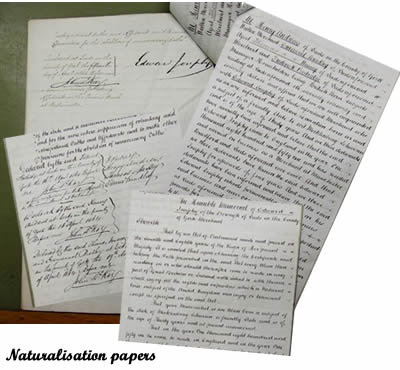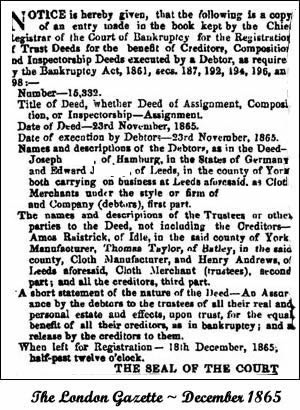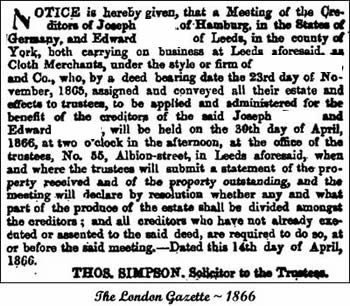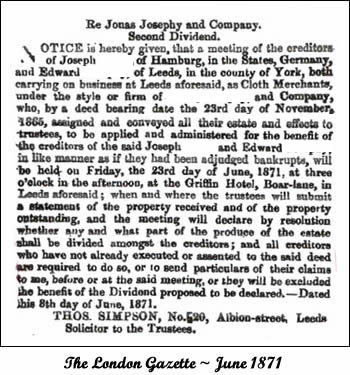In the twenty or thirty years after 1850, Mecklenburg in Germany had the third highest emigration count in Europe. People, especially the Jewish population, could see no prospect of a decent future in Mecklenburg due to the miserable social conditions caused by the ‘Right of Establishment Rules’, and left in their droves.

Most went to America, but some arrived in England and decided to settle here instead of travelling across to Liverpool to continue their journey, and Jewish communities built up in the cities along the route to the west coast, especially in Leeds and Bradford.
My great grandfather Heinrich (Henry) and his brother Bernard, along with their cousin Eduard (Edward was one of thirteen children) were three of these people who in 1851 plumped for England. It was a last minute decision for Edward who left Henry and Bernard in Leeds, where they had decided to put down roots, and continued across country with his own brother, Hugo, bound for America. It was not until the very last minute that Edward chose not to board the ship at Liverpool and as Hugo sailed into the sunset bound for New York, Edward made his way back to Manchester.
All the family were merchants by trade and Edward set about finding a job in the woollen business and making new friends, which he seemed to do with ease being an outgoing and personable sort of chap. But by 1860 he became aware that his cousins Henry and Bernard were doing rather well in Leeds, having set up their own separate textile businesses, and also that they were now naturalised British subjects. Edward moved to Leeds and by calling on his new friends in the wool trade to stand as referees, gained his naturalisation in 1861 – promising faithfully to remain in Great Britain, something which at the time he had every intention of doing.

Henry and Bernard had both bought suitable, but fairly modest, premises in Leeds from which to conduct their business affairs. Henry’s was the largest and comprised of a top floor for the offices, kitchen etc, a ground floor to store the rolls of cloth (mostly silks, mohairs, wool worsteds and cotton/wool mixes), and a basement in which was housed a huge beast of a baling machine and bale press (it is probably still there to this day, as to remove it would have necessitated taking the whole building apart!). Staff were kept to an absolute minimum, but each was loyal, and with sheer hard work and good business brains the two companies steadily grew and became more profitable, especially in the export market which was enjoying a boom.
Edward wanted a piece of the action and in order to raise the necessary funds, he went into partnership with a Joseph from Hamburg and they launched themselves as wool and shipping merchants in almost direct competition with Henry.
Modest premises were not Edward’s style and he found two vast warehouses abutting each other on the junction of two of the most expensive commercial streets in Leeds at that time. There was no way that he could afford to buy them and anyway they were not for sale at that time, but the rent was a small fortune. This did not deter Edward and Joseph and they took the lease. Probably partly on the back of the reputation of the family name, Edward and Joseph attracted customers from Bradford, Dewsbury, Osset, Batley and Golcar to name but a few Yorkshire towns and Edward lost no time in building his empire. By 1864 he had enough employees to form a cricket team; a jolly good one it was too and they regularly won their matches against other company teams!
However, winning cricket matches did nothing to pay the bills and competition with his quiet, steady and very successful cousins coupled with his massive overheads, took its toll, and just one year later Edward was in deep, deep trouble. To be fair, it does also have to be said that there was a sudden lull in woollen export demand around this time, but as Edward was already up to his neck in debt this was the last thing that he needed. Had the export market not suffered a dip, then maybe, just maybe, he might have survived, but he had gambled everything on this corner of the wool market and also by all accounts lived way above his means. He wanted everything and NOW, and it rather illustrates that the similar way of thinking which has partly caused our current credit crunch is actually nothing new – it was going on in the nineteenth century.

On 15th November 1865, a small notice appeared in the London Gazette, stating the dissolving of the partnership between Edward and Joseph.
Another notice in the Leeds Mercury was headlined “FAILURE IN LEEDS”, which went on to say that “Messrs. Joseph *** and Edward ***, Woollen Merchants, have found it necessary to call their creditors together. The liabilities of the firm are estimated at £40,000. A meeting will be held on Friday.”
On the same day, the report on the woollen trade market in Leeds was very sombre indeed, reflecting the worry of various creditors:-
“There has been a quiet market today, with only a few buyers being present. Selections have been of a miscellaneous nature for sorting up stocks. Purchases today have been for the home trade, the shipping trade not being as active as of late. The suspension of Messrs. Joseph ***, Edward ** Shipping Merchants, respecting which circulars have been issued, will affect manufacturers in this district, that firm having lately made some very heavy purchases here”
Good grief, that was an awful lot of money in those days. It’s a fair amount these days too, but the equivalent then was millions of pounds! Anyway, all goodwill and friendship from the trade and the press vanished overnight and the following is a sample of the mood at the time:-
LEEDS MERCURY, 20TH NOVEMBER 1865
“….the failure of Joseph*** and Edward*** on Wednesday last was announced with liabilities estimated at £40,000 and the chief creditors were said to be manufacturers in Batley Carr, Batley, Osset and Morley. The Dewsbury houses are pretty heavy sufferers, although none we believe higher than £1,200. In Batley, nearly the whole of the manufacturers are creditors for various sums. The firm who have thus suddenly suspended payment appear to have distributed their favours – if favours they can be called – pretty evenly among all the manufacturers on the Dewsbury and Gomersal turnpike road. We have it on good authority that there is a large quantity of goods belonging to the firm in France, Italy and America, consigned by the bankrupts, and it is not known at present if they can be secured for the creditors. Yesterday, at the request of some of the larger sufferers, a member of the firm of M Sheard of Batley left Leeds for Paris, with the purpose of, if possible, gaining possession of a number of pieces in that country”
One month later, on 16th December, a notice of impending auction appeared. The local auctioneers, Oliver & Son, were favoured with the instruction by the trustees acting for the creditors, to sell off all the stock of cloth and trade effects on 29th December 1865. Included in the lots were 1800 ends of valuable woollen cloth, which was quite a store. This of course was merely the start of proceedings to recover some money to pay off the debts. Creditors were more than disgruntled, they were downright hostile and understandably so, and Edward must have been having a very uncomfortable time indeed.

Bankruptcy proceedings ground on for many years, and indeed it was not until 8th June 1871 that a notice appeared in the London Gazette as follows:-
“Re Joseph ** and Edward ** and Company – Second Dividend.
Notice is hereby given that a meeting of the creditors of the above, who by a deed bearing date 23rd November 1865 assigned and conveyed all their estate and effects to trustees to be applied and administered for the benefit of the creditors of the said company, in like manner as if they had been adjudged bankrupts………….where the trustees will submit a statement of the property received and the property outstanding……. etc.”
Basically, it went on to say that what there was would be shared out and if anyone had not put forward a claim by this time, then they would receive nothing. Well, quite right too – they had had enough time!!
(All creditors WERE eventually paid off in full, although Edward and Joseph had to sell everything they owned to achieve this and eventually there was a final record under ‘Receipt of Donations to the Leeds General Infirmary’, in the sum of £39 being the remaining balance from the estate of the late firm of Edward and Joseph.)
Edward fled to New York in 1869 to live with his brother Hugo, but this is something of a puzzle in a way, because I am wondering whether he left England illegally. Certainly, he arrived in New York well before his affairs had been fully wound up and I would have thought that until the bankruptcy dealings had been settled he would have been required to remain in Leeds. Perhaps I am wrong. It actually matters little, because tragically one year later Edward committed suicide, which was actually not that uncommon for German Jews who had failed in business. The timing of his suicide was June 1871, the very month that all his remaining assets were distributed amongst his creditors.
As a postscript, Hugo’s first son was born in 1877 and he named him Edward. This surely shows that he cared for his brother very much indeed, as also does the fact that he hid many of the unpleasant details of Edward’s last years from their family back in Germany. Hugo was in regular written correspondence with his sister, but he chose not to tell her what actually happened and it is good that all the loving relations in Germany died without knowing the sad truth.
sally
© sally 2009
Sources
A great deal of the story is pieced together from information gathered from letters, word of mouth etc.
I have a contact in Germany to whom I am related and who is totally committed to researching the family name – we correspond quite regularly. He was puzzled by Edward because he has letters written by Hugo from New York to his sister (my contact’s direct ancestor) much of which was about Edward and his life in England, however by 1870 the references became very vague and then stopped altogether. It was these letters that filled in the meat for Edward’s first years in England, along with the information on the Naturalisation papers and odd articles in the Leeds Mercury. In Germany, they all assumed that Edward died in England but I spent night after night searching for his death and finally realised that he just was not there, and nor was he around on any of the censuses.
The Naturalisation Papers were found, and sent to me, by a member of GR who was researching relatives who had had dealings with my ancestors.
My father inherited the textile exporting company in Leeds from his father and grandfather (Henry in the story), and the details of the buildings are from my own memory as a child when he used to take me there on Saturday mornings whilst he did some work – Henry’s brother Bernard’s offices and warehouse were a few doors down in the same street. Father, although having no knowledge of Edward and his Company, told me that the area where Edward had his warehouses etc. was very expensive indeed. All the references to my great grandfather Henry and his business are of course from family knowledge.
I have another contact in Canada, whose husband is related to Hugo, Edward’s brother – on a hunch, I asked her to check the New York Census and also for a death, and she found Edward on both, she also found other documents relating to Hugo dealing with Edward’s death.
The London Gazette
19th Century British Library Newspapers
[/et_pb_text][/et_pb_column][/et_pb_row][/et_pb_section]